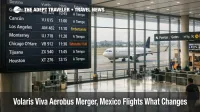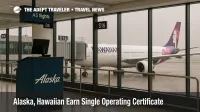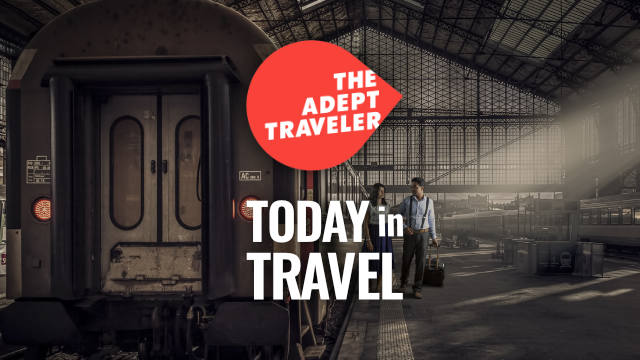Airline Merger
Airline mergers are significant events in the travel industry, impacting various aspects from flight availability and ticket prices to passenger experience and loyalty programs. The consolidation of two or more airlines leads to operational efficiencies, expanded networks, and often a reshaped competitive landscape. For travelers, these mergers can offer a mix of opportunities and challenges, influencing both business and leisure travel experiences.
Economic Implications of Airline Mergers
One of the immediate effects of an airline merger is the potential for cost savings through streamlined operations. By combining resources, airlines can reduce redundant routes and optimize fleet usage, lowering operational expenses. These savings can then be reinvested into service improvements or passed on to consumers through lower ticket prices.
However, the opposite can also happen. In markets with less competition due to a merger, ticket prices might increase. Reduced competition can lead to higher fares as the merged airline gains more pricing power. Hence, the impact on travel costs can vary widely depending on the specific routes and regions involved.
Expanded Route Networks
Travelers often benefit from an expanded network of routes after an airline merger. The consolidation of two carriers typically results in a more comprehensive schedule and increased flight options. This can make it easier for passengers to find direct flights and reduce the need for connecting flights, ultimately shortening travel times.
For instance, a merger between two airlines with complementary networks can significantly enhance connectivity. Passengers may discover new direct flights between previously under-served city pairs, increasing the convenience of air travel. These expanded networks can prove especially beneficial for frequent flyers who rely on specific routes.
Frequent Flyer Programs and Loyalty Benefits
Frequent travelers often have concerns about how airline mergers will affect loyalty programs and accrued miles. Typically, airlines work to integrate their loyalty programs as smoothly as possible, aiming to retain customer satisfaction. Merging loyalty programs can offer enhanced benefits, such as access to more destinations, additional partner airlines, and improved upgrade opportunities.
However, the transition period during and immediately following a merger can sometimes be bumpy. Travelers may face complexities, such as changes in reward redemption rates or discrepancies in tier status recognition. Keeping an eye on official communications from the airlines involved can help frequent flyers navigate these changes more effectively.
Service Quality and Passenger Experience
The quality of service is a critical aspect for passengers, and airline mergers can lead to varied experiences. On one hand, a merger can bring positive changes like fleet upgrades, better in-flight entertainment options, and improved airport lounges due to pooled resources. A more extensive network might also result in more uniform and enhanced in-flight services across the broader combined airline.
On the other hand, combining two different corporate cultures and service standards can be challenging. During the integration phase, passengers might encounter inconsistencies in service quality or other operational inefficiencies. While airlines strive to smooth these transitions, the initial period post-merger can often be rocky.
Employee Impact and Operational Considerations
Airline mergers not only affect passengers but also have substantial implications for airline employees. Streamlining operations often leads to workforce restructuring, which can result in job redundancies. However, a merger can also open up new career opportunities as the combined airline expands routes and services.
Operationally, the merging process involves integrating different systems, technologies, and procedures. This can lead to temporary hiccups in areas like baggage handling, check-in processes, and customer service interactions. The efficiency of this integration plays a crucial role in determining the impact on travel experiences.
Regulatory and Legal Aspects
Airline mergers don't happen overnight; they undergo rigorous scrutiny from regulatory bodies to ensure they don't create monopolies or harm consumer interests. Governments and aviation authorities assess factors like market share, competitive impact, and consumer protections. This regulatory process aims to balance the benefits of operational efficiencies against the risk of reduced competition.
For travelers, this means that the timeline for a merger to finalize can be lengthy, sometimes spanning multiple years. During this time, airlines may operate independently, causing market uncertainties until the merger is fully approved and executed.
Impact on Smaller Markets and Regional Airports
Not all effects of airline mergers are positive, especially for smaller markets and regional airports. Often, these mergers result in the consolidation of flights into larger hubs, potentially reducing the frequency of service to smaller cities. This can inconvenience travelers who rely on regional airports for their travel needs.
Additionally, the reduction in service to these smaller markets can have a broader economic impact, influencing business travel and tourism in those regions. Local governments and businesses may need to adapt to the changes brought about by the merger.
Adapting to Airline Mergers as Travelers
For travelers, adapting to the changes brought about by airline mergers involves staying informed and being flexible. Monitoring updates from the airlines, understanding new route offerings, and familiarizing oneself with the refreshed loyalty programs can help in making the most out of the new opportunities. Additionally, considering alternative airlines or travel modes can be beneficial in areas affected by reduced flight availability.
Engaging with customer service and providing feedback to the airlines can also contribute to a smoother transition. Airlines often take traveler feedback seriously as they work to integrate and streamline their operations.
In summary, airline mergers bring a complex set of changes to the travel landscape. From economic implications and route expansions to service quality and regulatory challenges, these mergers shape the future of travel in both positive and negative ways. By staying aware and proactively adapting to these changes, travelers can navigate the evolving airline industry landscape with ease.
Allegiant Sun Country Merger, What Happens to Flights

Volaris Viva Aerobus Merger, Mexico Flights What Changes

Spirit Frontier Merger Talks Could Change 2026 Fares

Alaska, Hawaiian Earn Single Operating Certificate

Travel News: Strikes at London Heathrow, Spirit-JetBlue Merger, and Disabled Travel

Travel News: Strikes in UK & Scotland, and an update on JetBlue/Spirit Merger

Travel News: Stikes in Italy, Spirit & JetBlue, and Starlink on Planes

Travel News: Spirit-Frontier-JetBlue, Royal Caribbean, and the Venice Simplon-Orient Express

Travel News: Jamaica, Abercrombie & Kent, and the Spirit - Frontier - JetBlue Merger

Travel News: Princess Cruises, New River Cruise, and a Spirit/Frontier/JetBlue Update

Travel News: Spirit - Frontier - JetBlue, New River Cruise in France, and Cayman Islands

Travel News: Japan, New Zealand, and JetBlue - Spirit - Frontier Merger

Travel News: JetBlue, Japan, and the United States

Travel News: Spirit - Frontier - JetBlue Merger Updates

Travel News: Air Travel Mask Mandate, New No-Fly List, and a JetBlue & Spirit Update

Travel News: Spirit & Frontier Merger, South West Airlines, and more Frontier News

